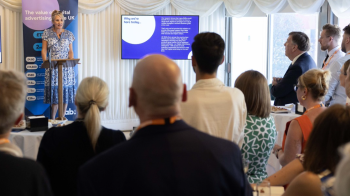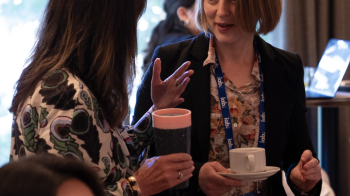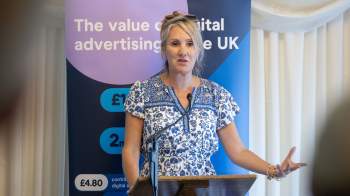Less healthy food and drink ad ban: What it is & how it works
Posted on Thursday 22 May 2025 | IAB UK
As of 1st October 2025, paid-for online ads for ‘less healthy’ food and drink (LHF) products are restricted. Read our up-to-date explainer of the guidance
From 5 January 2026, paid-for online ads for ‘less healthy’ HFSS (high fat, salt, or sugar) products will be banned by law. However, as a show of goodwill, and in preparation for legal enforcement, the Government has asked that advertisers comply with the ban voluntarily from 1 October 2025 (the previous implementation date for the restrictions – more on why this changed here).
The ban applies to all UK-targeted ads, regardless of the audience's age. There’s also a ban on TV ads before 9pm, but this explainer only focuses on the online ad ban.
The details of the ban are set out in law, and the secondary legislation was made in December 2024, specifying the precise types of products in scope of the ban and detailing the exemptions, which apply to SMEs and for audio-only media/ads on the internet.
Which ads are banned?
Paid-for advertising for ‘identifiable’ HFSS products (high fat, sugar or salt) that are classified as ‘less healthy’. These are referred to as ‘LHF’ products.
‘Identifiable’ means that an average consumer could reasonably be expected to recognise the product(s) from the ad.
A product is considered ‘less healthy’ if both of these points apply:
- It is classified as HFSS (high fat, sugar, or salt) by the nutrient profiling model. This has been in place for many years and brands and advertisers are likely to know if their products are HFSS or not. For more information see the Advertising Standard’s Authority’s explainer
AND
- It is in one of the ‘less healthy’ product categories within the HFSS bracket. See the Advertising (Less Healthy Food Definitions and Exemptions) Regulations 2024 for a detailed list, as well as explanatory guidance from the Department for Health and Social Care on the food and drink categories in scope.
Are there any exceptions?
Yes, some ads are still allowed, such as:
- Ads for HFSS products that aren't classified as ‘less healthy’ according to the criteria above. These ads must follow the existing rules in the CAP Code
- Ads in audio-only content/media or audio-led platforms, such as podcasts (if they are audio-only), or music-only streaming services
- Ads paid for by SMEs (fewer than 250 employees) advertising products that they make or sell
- Brand ads i.e. ads that do not depict a specific LHF product or products
- Non-paid for marketing in brands’ own media (e.g. websites, organic social content)
- B2B ads
- Digital out-of-home ads
What are the rules for HFSS ads that are still allowed?
All permitted online HFSS ads must follow the CAP Code, which prevents targeting under-16s. This includes both ads for HFSS products and brand ads that have the effect of promoting an HFSS product.
On-demand & IPTV rules
If the service is regulated by Ofcom, the 9pm watershed rule applies. If not, the online ad ban applies.
Who is responsible for complying with the online ban?
The ban is linked to paying to advertise, so whoever pays for an ad campaign (usually the advertiser) has to make sure their ads are in line with the law. Other companies involved in delivering the campaign are not legally responsible but should be aware of the rules. Companies might want to update their own processes and terms and conditions to reflect the new ban.
What happens if an ad breaks the rules?
The advertising regulator, the ASA, will enforce the rules and it has a range of powers it can use if an ad breaks the rules. It can also refer an advertiser to Ofcom, which has the power to impose fines.
Where can I get detailed guidance?
In addition to the Government’s guidance on in-scope products, CAP, the body responsible for the UK advertising rules is updating the CAP Code and producing industry guidance on how to comply with the ban from 5 January 2026.
Why is the Government asking brands to stop LHF product ads from 1 October?
The Government always intended LHF restrictions to come into force on 1st October. However, in recognition of calls from IAB UK and others to legally exempt brand ads from restrictions, on 22 May 2025, the Government committed to change the law to make clear that brand ads are out of scope of the restrictions. To allow time for the law to be changed, the Government also committed to move the legal implementation date to 5 January 2026.
To secure this crucial legal change, industry leaders agreed to support a voluntary ban on LHF product advertising from 1 October 2025. This compromise means that the Government’s intention to implement restrictions from 1 October is honoured, while ensuring that advertisers have the legal clarity they need to continue to run brand ads with confidence.
We ask that all advertisers comply with the voluntary ban from 1 October as a show of good faith and in preparation for the legal enforcement date on 5 January 2026.
Frequently asked questions
I’m not an advertiser – do these rules affect me?
The ban applies to paying to advertise online – if you’re not a paying advertiser, you are not responsible for complying with the ban, but you should take steps to avoid hosting or delivering banned ads.
Does the ban apply if we’re advertising in adult-only spaces, or only to adult audiences?
Yes, it applies regardless of the audience age.
Are digital out-of-home ads banned?
No, they’re not part of the online ban. The existing CAP Code HFSS rules still apply to these ads.
Does this only affect display advertising?
No, it covers all paid-for advertising for LHF products online (except in audio-only media) such as search and social, video, in-game and in-app, etc. The only exceptions are those listed above. The ban applies to all ad formats including:
- Paid-for listings on price comparison or aggregator services, such as sponsored listings on food delivery services
- Paid-for online display advertising, such as banner ads on news websites and apps, swipe to buy
- Paid-for online video advertising, such as video ads served before or during the content on video sharing sites
- Paid-for online social media advertising, such as in-feed advertising on social media.
- Paid-for search listings, such as sponsored links on search engines
- Paid-for influencer marketing, such as influencer posts paid for/sponsored by an advertiser
- Paid-for newsletter advertising, such as banner ads in a cookery newsletter
- Paid-for advertisements distributed through web widgets, such as those located on the sidebar of websites
- Paid-for advertorials
- Paid-for advergames
- Paid-for sponsorship
What about brand advertising?
Ads promoting a food/drink brand, including the brand of a range of products, are not subject to the restrictions, provided that the ad does not depict a specific LHF product or products. That means that advertisers can continue to run brand ads after 1 October 2025.
The regulations place some limits on what can be shown/ included in brand ad, so it’s important that advertisers understand the scope of the brand exemption. Read more about the brand exemption here.
What about social media ads?
The ban applies to paid-for social media ads for ‘less healthy’ products, but not other content. The CAP Code rules still apply to advertising/marketing that is allowed, whether it’s paid for or not.
Do these rules apply to alcohol ads?
No. Alcohol ads have separate, existing rules.
How do the rules apply to IPTV (Internet Protocol TV)?
The 9pm TV watershed will apply to Ofcom-regulated IPTV services - the same as other Ofcom-regulated TV and on-demand programme services.
Related content
IAB UK manifesto for growth in digital advertising
Learn moreCAP issues updated LHF guidance for consultation
Learn moreGovernment confirms brand ads exemption in LHF ad ban
Learn moreIAB UK responds to ICO call for views on regulatory approach to low-risk advertising
Learn more
Fast forward to 2030 with Futurescape
An in-depth exploration of the attitudes, innovations and media shifts that will shape the years ahead and redefine how we advertise by the turn of the decade



